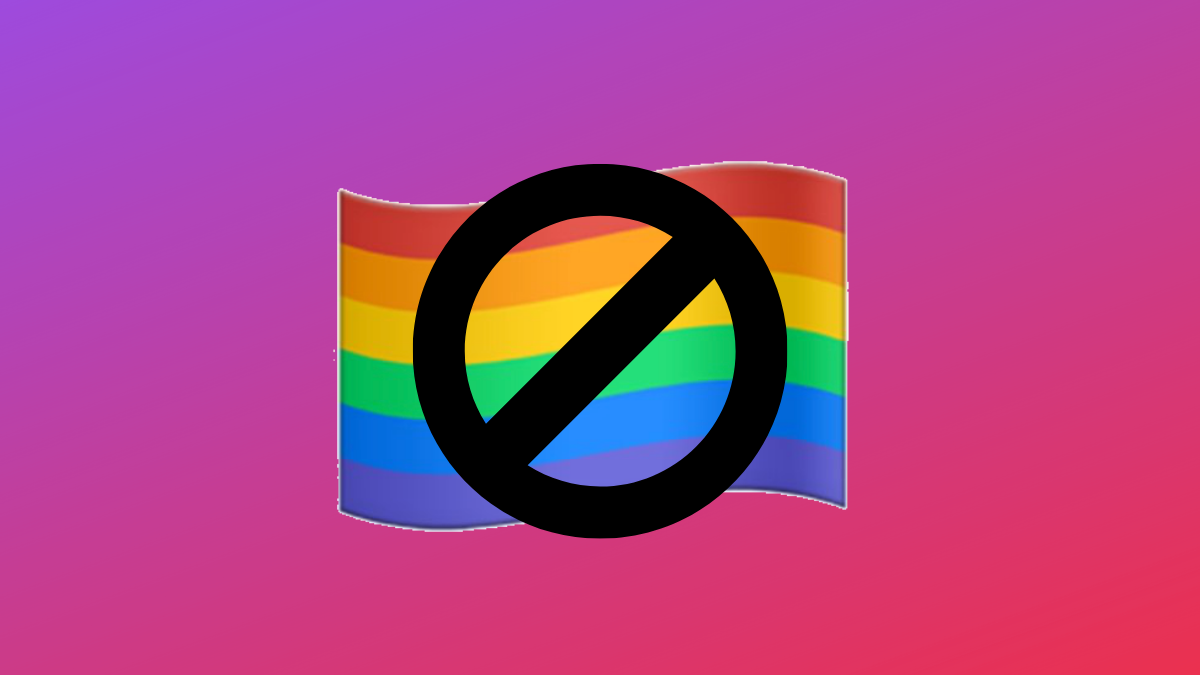
A trans non-binary model and writer has called on Instagram to ban an anti-LGBT ‘emoji’ after the social media platform ruled that it does not go against its Community Guidelines.
Radam Ridwan, who has more than 33,000 followers on the app, first received messages containing the graphic in December 2019, when it appeared in their comments and direct messages.
While Ridwan states that the comments were found not to be against the app’s rules, comments they “made in return joking about these bullies/trolls” were.
Although not technically an emoji, the image is created by combining the ‘prohibited’ character with the rainbow pride flag emoji – a ‘hack’ in the Unicode coding system.
A description on Emojipedia’s entry for the pride flag reads: “[The graphic] can be created using a combining character to show a black and white glyph like [prohibited] on top of the rainbow flag. This is possible with any emoji on supported platforms.”
The icon first surfaced online in February 2019, when it went viral and sparked outrage among Twitter users.
Read more
In an Instagram post detailing their campaign, Ridwan writes: “These [community] guidelines are protecting bullies and bigots, leaving LGBTQIA+ people to face this abuse without the tools to stop it.
“A $100 billion tech company *must* be tech-savvy enough to automatically remove the symbol and ban users seen utilising it to abuse us.”
Speaking to Indy100, Ridwan added that they have been trying to get the attention of Instagram to make a statement on the icon and why it is not against the platform’s guidelines.
“Even if it is not possible to prevent users from making this symbol … Instagram has a responsibility to overhaul their Community Guidelines to protect LGBTQIA+ creators,” Ridwan said.
#BanTheHateEmoji involves several demands for Instagram, including filtering out the ‘hate emoji’ from comments, better diversity and inclusion training for comment and account moderators, and making “continued abuse towards LGBTQIA+ accounts more clearly stated” as being against the app’s rules.
Since launching the campaign, Ridwan says they have received increased levels of abuse on the platform.
“I am now receiving vitriolic comments and messages including death threats and videos of the rainbow flag being burned and replaced with a Nazi swastika every day.
“When I block these accounts, new accounts are being created to attack me. These people have found my email address and are sending similar hate-filled emails as well,” they said.
It isn’t the first time Ridwan has encountered issues on the platform either. In December, the creator was banned from Instagram following an “influx of reports” from users leaving the hate emoji on their posts.
Their account was later reinstated, but only after a campaign to have it unsuspended was launched on their behalf.
The launch of #BanTheHateEmoji came just days before Facebook’s Oversight Board announced that it would allow appeals from users around content left up on Facebook or Instagram.
Previously, the board – an independent panel which reviews content decisions made by the social media company – could only pass judgement on material removed from the platform, not content which remained after a user reported it.
“After you have exhausted Facebook’s appeals process, you will receive an Oversight Board reference ID in your support inbox and can appeal the decision to the Board. You can appeal decisions on posts and statuses, as well as photos, videos, comments and shares,” a news article from the board reads.
When asked about whether the enforcement could extend to accounts, a spokesperson for the oversight board said: “The board has broad ability to deliver recommendations that we believe will improve Facebook’s approach to content moderation. This could include recommendations on account enforcement in particular scenarios.
“Account suspensions are also something the board expects to look at in the future.”
In a statement, a Facebook company spokesperson told Indy100: “We want everyone to feel safe and welcome on Instagram, and we don’t allow content that attacks people because of who they are – whether it’s their sexual orientation or gender identity.
“This isn’t an emoji that we offer at Instagram, and when we become aware that it’s being used to attack people, we’ll remove it.”
The company continued to say that the icon is not something Facebook or Instagram controls, but that it is investigating multiple comments on Ridwan’s account at the moment which have used the anti-LGBT icon.